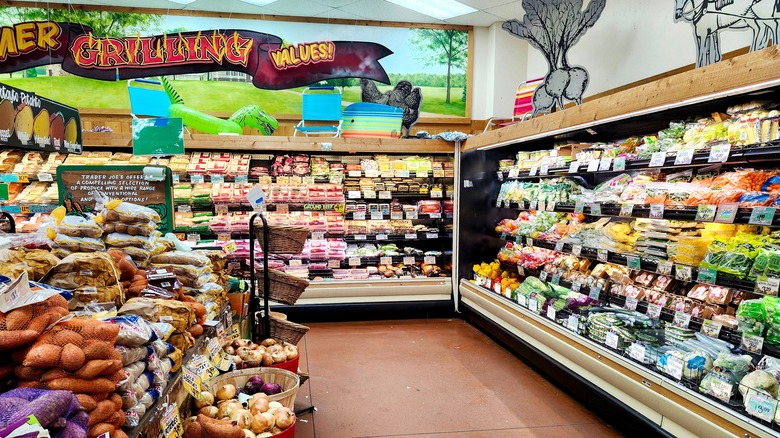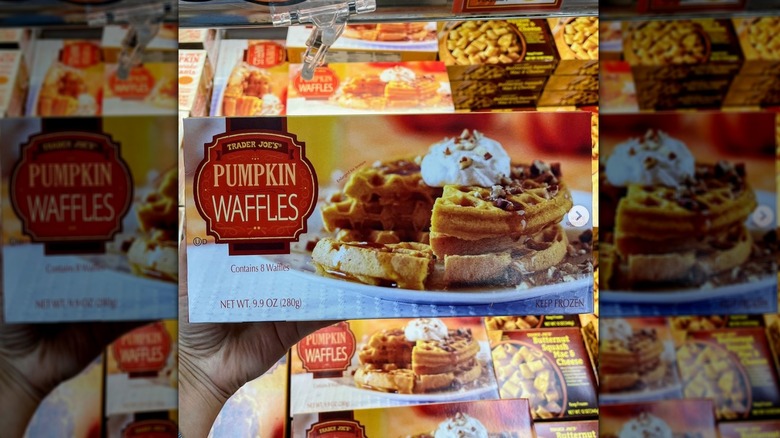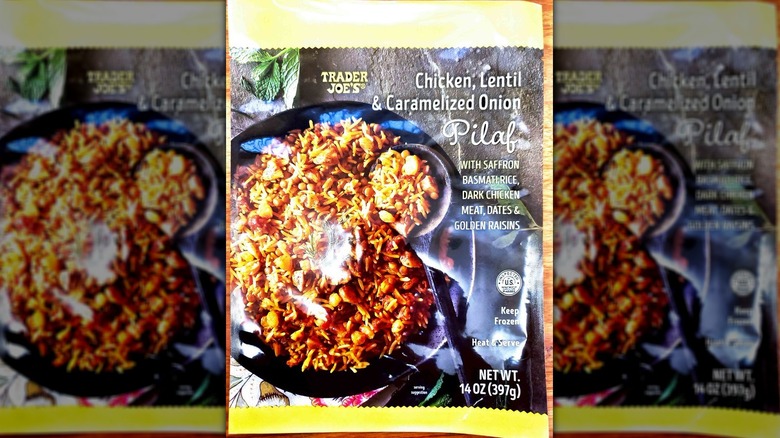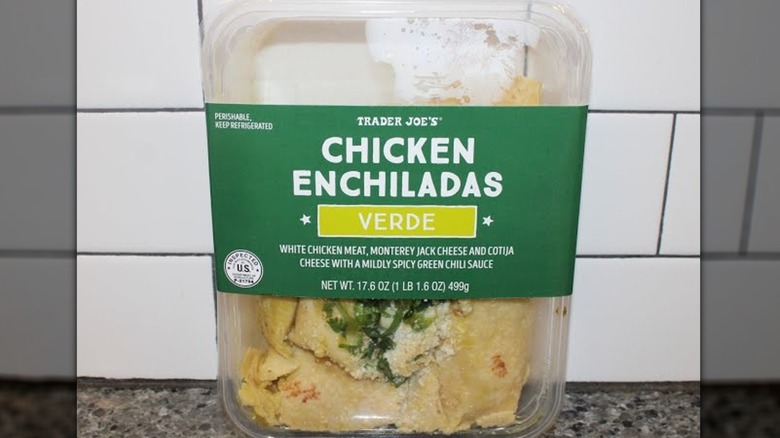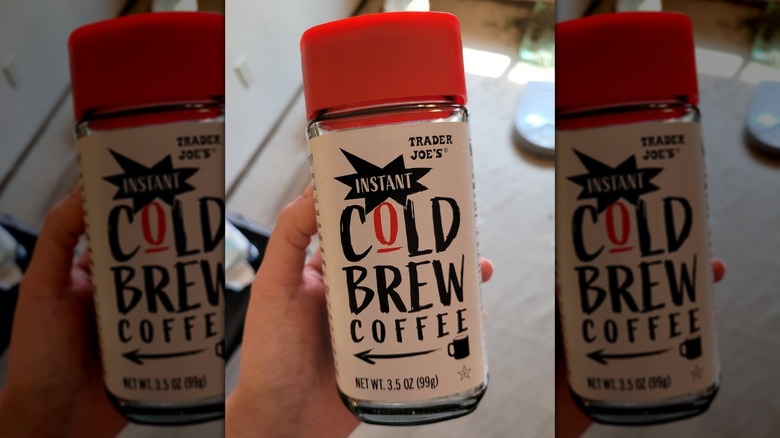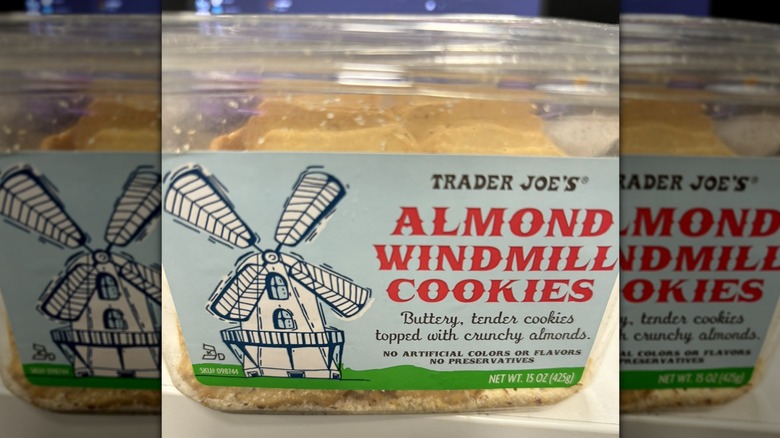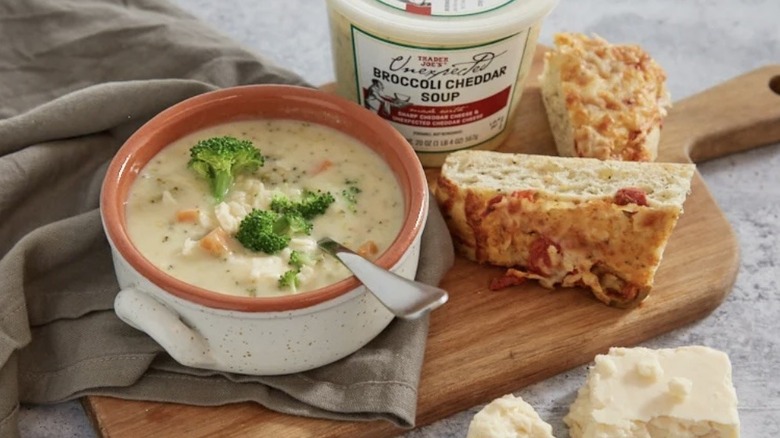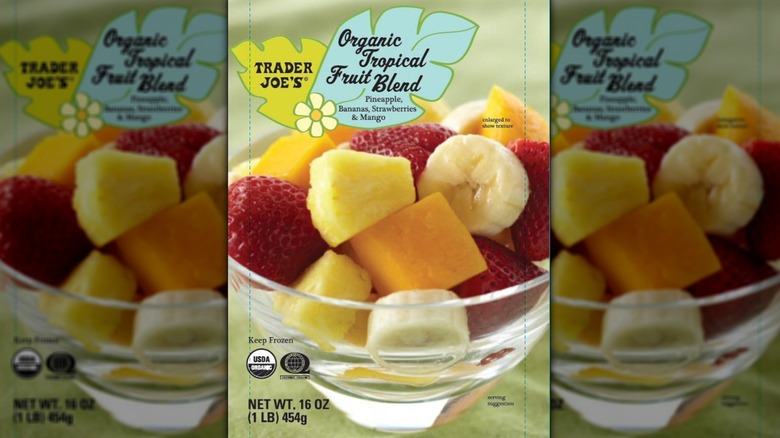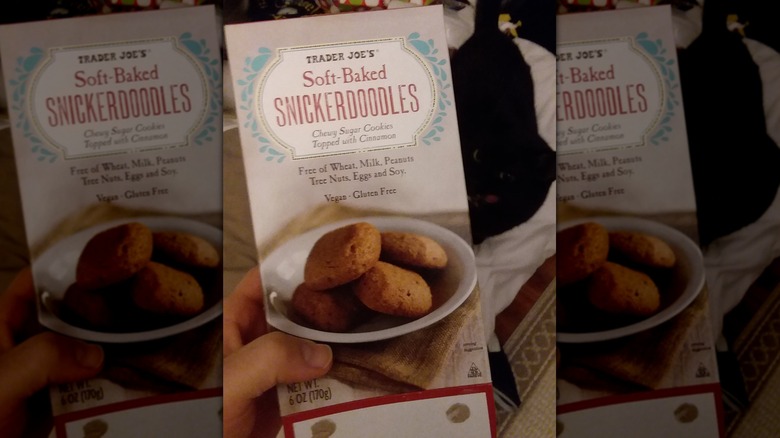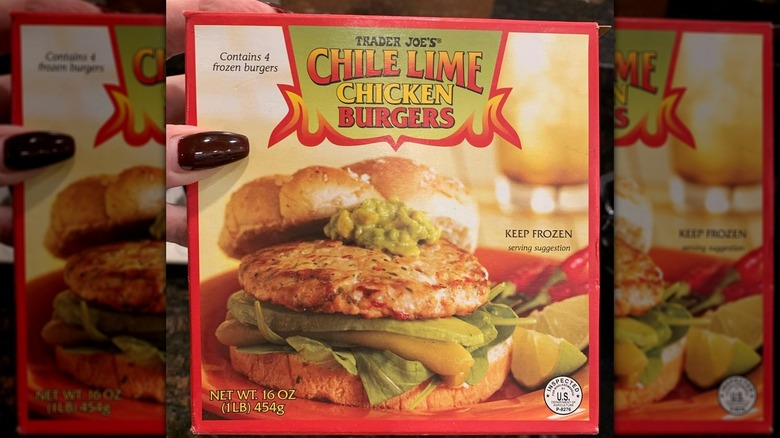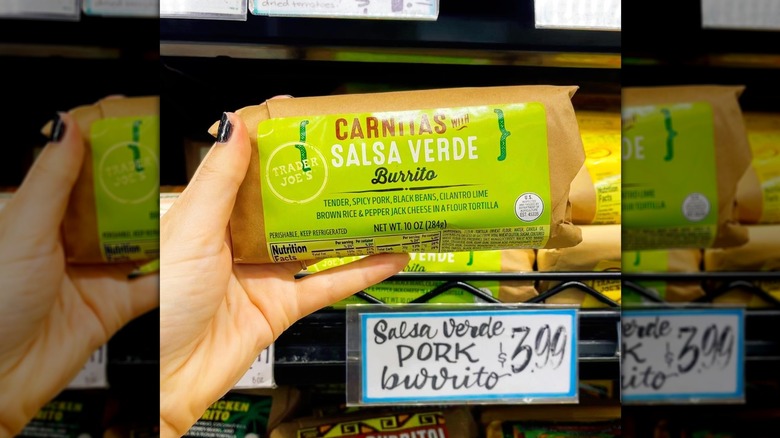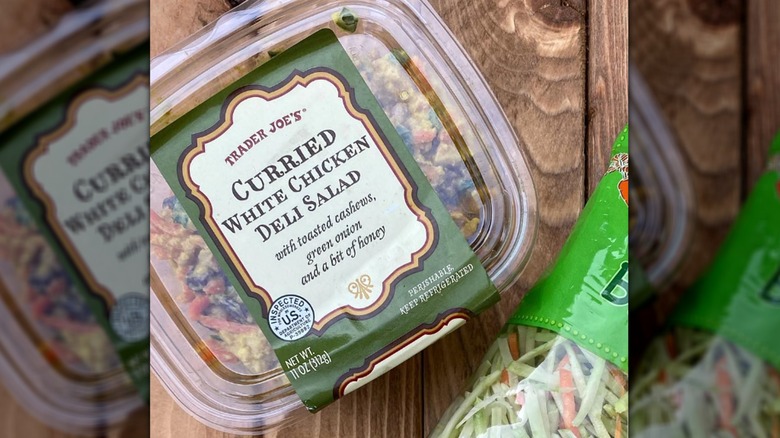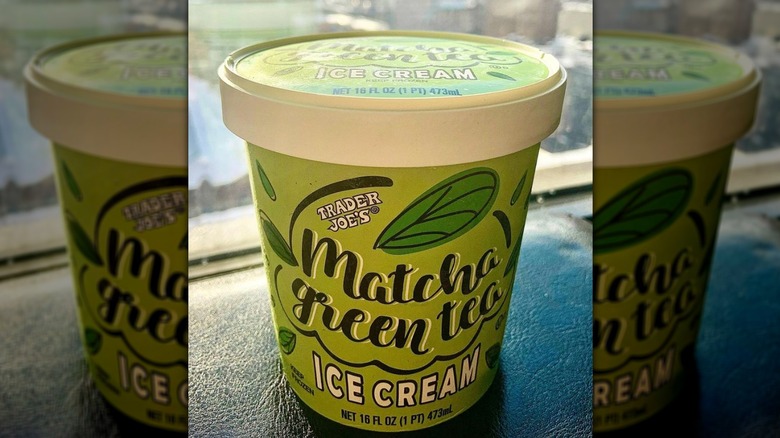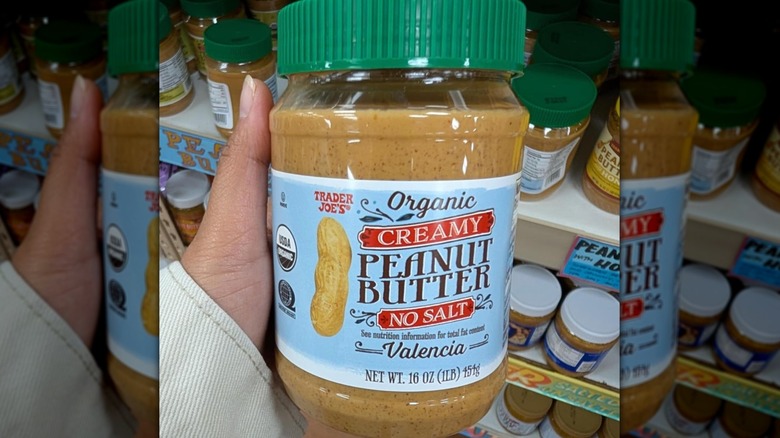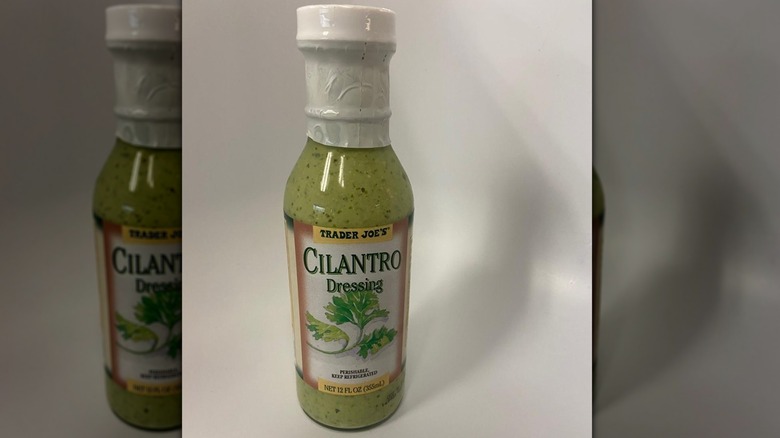The Biggest Trader Joe's Recalls
Plenty of people have a favorite grocery store, but the people who love Trader Joe's are a whole other level of dedicated. With an ever-evolving array of eclectic snacks, consistently friendly service, and — most importantly — reliably affordable prices, it's easy to figure out how the chain has carved out such a special place in the hearts (and wallets) of the American people. But despite its prestige, Trader Joe's isn't totally immune to the pitfalls that plague other grocery stores. That includes the thing supermarkets dread above all else: product recalls.
If it feels like recalls are everywhere lately, you're not wrong. The number of recalls in the U.S. increased by 20% between 2020 and 2023, per TraceOne. Most stem from some kind of contamination, whether that be bacterial — like salmonella and listeria — or an issue of foreign materials ending up somewhere they shouldn't. When it comes to Trader Joe's, these issues have affected everything from waffles to veggies. While some cases have been pretty standard food safety scandals, others have been seriously bizarre (think insects in soup and cookies, with an added side of rocks).
Of course, in the grand scheme of things, your odds of being impacted by a food recall on a daily basis are still slim. However, just to give you an idea of what can — and does — go wrong before your favorite products hit Trader Joe's shelves, we've rounded up some of the biggest recalls throughout the chain's history.
Three kinds of waffles were pulled over listeria fears
In October 2024, Trader Joe's asked that customers throw away not one, not two, but three different varieties of its waffles. Its blueberry, gluten-free, and pumpkin waffles were all caught up in a larger waffle reckoning across both the U.S. and Canada, sparked by the realization from TreeHouse Foods that some products produced in its facility may have been contaminated with listeria monocytogenes.
The vast majority of major grocery store chains were impacted by the frozen waffles recall, including Kroger, Target, Publix, Albertson's, Wegmans, and Aldi. No actual confirmed cases of illness were ever reported, but it's always better to be safe than sorry when it comes to listeria. The bacteria can cause an illness called listeriosis, the symptoms of which include vomiting, diarrhea, fever, and joint pain. It has the potential to be extremely serious for vulnerable patients — especially pregnant people, newborns, and the elderly — and has an alarmingly high mortality rate of 20% to 30%.
Chicken, Lentil, & Caramelized Onion Pilaf contained hidden rocks
Trader Joe's only added Chicken, Lentil, & Caramelized Onion Pilaf to its lineup in January 2024, but by February it was already being urgently recalled. The supermarket chain warned that the frozen meal — which contained basmati rice, green lentils, diced caramelized onions, dark meat chicken, golden raisins, and dates — may contain a bonus ingredient made of foreign material.
While Trader Joe's itself didn't go into detail about what kind of material lurked in its pilaf packets, the U.S. Department of Agriculture's Food Safety and Inspection Service spilled the tea for us, instead. As per a public health alert, multiple customers had complained to Trader Joe's that they'd found rocks in their pilaf. One of these unfortunate shoppers made the discovery after receiving a mid-meal dental injury. Anyone who'd purchased but not yet eaten the Chicken, Lentil, & Caramelized Onion Pilaf was urged to either throw it away or return it to a Trader Joe's store for a refund ASAP.
Three products containing cotija cheese were recalled after 24 people fell ill
With high moisture, low salt, and low acidity, soft cheese provides the perfect breeding ground for listeria. We witnessed this unfortunate truth in action in February 2024, when California-based food manufacturer Rizo Lopez Foods Inc. recalled all of its dairy products – regardless of their expiry date — due to listeria fears. This recall impacted a long list of items, including four containing cotija cheese at Trader Joe's: Chicken Enchiladas Verde, Cilantro Salad Dressing, Elote Chopped Salad Kit, and the Southwest Salad.
This listeria outbreak proved to be extremely serious, with 26 people falling ill across 11 states. Of this group, 24 people were hospitalized, and two died, while one pregnant victim suffered a miscarriage. While the recall orders only hit in February, it's thought that the outbreak actually began many years earlier, with an investigation by the Centers for Disease Control noting that the strain was originally identified back in 2014. In October 2024, Rizo Lopez Foods was ordered to stop manufacturing at its dairy facility in Modesto, with the company also warned that it must notify the government if it wants to pursue preparing and processing food again in the future.
Instant Cold Brew disappeared for months over shards of glass
Trader Joe's managed a miracle with its Instant Cold Brew, which takes the long, laborious process of making a cold brew and condenses it into a matter of minutes while also managing to make the final product taste (nearly) as rich and flavorful as the real thing. That's why fans were borderline distraught when the store removed jars from its shelves in May 2023 — even if it was for a very valid reason.
The chain made the decision to recall the coffee after being warned by its suppliers that it may contain shards of glass. Unsurprisingly, Trader Joe's didn't want its customers sipping on something with the ability to quite literally cut their throat, hence the recall. Fans were left bereft of Instant Cold Brew for several months, until it made its triumphant return to Trader Joe's stores in 2024. This time around, the jar was made of plastic, not glass (wonder why). Some also noted that it tasted slightly different than it did pre-recall. However, at least it made a return in some form, which is more than we can say for some discontinued Trader Joe's products of days gone by.
Trader Joe's removed and destroyed two kinds of cookies containing more rocks
If you've got a sweet tooth, Trader Joe's is nothing short of paradise. While you'll find all the classics in-store — such as chocolate chip and snickerdoodles — some of its strongest offerings are the more niche varieties. Almond Windmill and Dark Chocolate Chunk and Almond both fell into that category until Trader Joe's pulled them from shelves in July 2023 due to yet another case of rocks making their way into its food.
Obviously, Trader Joe's removed and destroyed all of the affected cookies from its stores. It's not totally clear how the rocks ended up in the cookies, but it's safe to assume that they were a byproduct of almond harvesting considering that this was the primary ingredient both varieties had in common.
Insects found their way into Unexpected Broccoli Cheddar Soup
To say that Trader Joe's Unexpected Cheddar has a cult following would be an understatement. To many, this is the crème de la crème of the store's dairy aisle. Unexpected Cheddar was voted Best Cheese at Trader Joe's Annual Customer Choice Awards for eight years in a row (until it was toppled by the cheddar cheese with caramelized onions in 2023) and has since been put to good use with other flavors to create equally tasty products, such as the Unexpected Broccoli Cheddar Soup.
Unfortunately, this soup was a little harder to find than usual in July 2023. Trader Joe's supplier, Winter Gardens Quality Foods, Inc., had warned the store that its Unexpected Broccoli Cheddar Soup contained something, well, unexpected: insects. As per the FDA, they'd snuck via the frozen broccoli florets. By that point, the affected soup had already been distributed in Florida, Illinois, California, Texas, Washington, Pennsylvania, and Connecticut, meaning Trader Joe's had to recall 10,889 cases — containing 130,668 tubs — as quickly as possible.
As far as recalls go, it was relatively minor (even if the idea of broccoli, cheddar, and insect soup is pretty gross). The FDA only defined it as a Class III recall, a classification reserved for "a situation in which use of, or exposure to, a violative product is not likely to cause adverse health consequences."
Organic Tropical Fruit Blend was potentially contaminated with Hepatitis A and listeria
It's not completely rare for a grocery store to recall an item over fears of contamination. What is slightly more uncommon is for them to recall the same item twice in a row for two different kinds of contamination. And yet, in early 2023, Trader Joe's did just that.
Mid-March saw it recall its Organic Tropical Fruit Blend — which combined frozen strawberries, pineapple, bananas, and mango – due to an outbreak of hepatitis A. It was one of six frozen strawberry products pulled over the virus, which can cause a contagious liver disease with symptoms including fatigue, stomach pain, jaundice, and dark urine. According to the Centers for Disease Control and Prevention, all of those suffering from the virus recalled recently eating frozen strawberries. However, hepatitis A hadn't been detected in any of the products in question, with the recall acting more as a precautionary move.
But the drama wasn't over yet. Just three months later, Trader Joe's Organic Tropical Fruit Blend was recalled once again. This time, it was the pineapples, not the strawberries, that faced scrutiny over potential listeria contamination. Similar products produced by the same supplier were also recalled from Walmart, Target, Whole Foods Market, Aldi, and AWG (Associated Wholesale Grocers). Again, no illnesses were reported, but we'd personally always rather ditch a bag of fruit than take our chances with listeria.
Soft-Baked Snickerdoodles fell victim to foreign matter contamination
Trader Joe's Soft-Baked Snickerdoodles were hugely popular in their time, managing the rare achievement of being free of wheat, milk, peanuts, tree nuts, eggs, and soy, plus being both vegan and gluten-free. As if that wasn't already an impressive feat, they also happened to taste delicious, with Trader Joe's customers praising their chewy, gingerbread-esque texture.
Technically, the Soft-Baked Snickerdoodles never promised to include plastic on that "free-from" list. It still recalled the snickerdoodles regardless in July 2022 when it emerged that hard pieces of plastic had popped up in people's cookies. This followed a recall from a Trader Joe's supplier, Enjoy Life Natural Brands, which had previously pulled several brownies and cookies from circulation for the same reason just one month earlier. Luckily, nobody was injured as a result of plastic-laden cookies. While the Soft-Baked Snickerdoodles stuck around for a while longer post-recall, they've since seemingly been discontinued.
Nearly 100,000 pounds of Chile Lime Chicken Burgers may have contained bone fragments
Plastic and glass are one thing, but bone fragments? No, thank you. Back in November 2021, Trader Joe's urgently recalled nearly 100,000 pounds of chicken after some of its customers bit into something that should theoretically have been removed long before patties hit the store freezers.
The Chile Lime Chicken Burgers were processed by Innovative Solutions, Inc., which also recalled unbranded spinach feta chicken sliders from other stores. As is always the case with frozen products — which have a habit of lurking in the freezer for extensive periods of time undetected — customers were urged to check that they weren't accidentally harboring any of the affected products.
Nobody was injured by the aforementioned bone fragments, but we can't imagine it made for a particularly enjoyable culinary experience for anyone who happened to cook one of the bony burgers pre-recall. Perhaps coincidentally, Trader Joe's customers have reported the Chile Lime Chicken Burgers as missing for several years now. While there's no saying if their disappearance is connected to the recall, the timing does seem awfully suspicious.
Carnitas with Salsa Verde Burrito were included in a recall of 795,261 pounds of meat
The only thing worse than listeria or salmonella contamination is both at the same time. Bakkavor Foods USA hit a food safety nadir in October 2018 when multiple ready-to-eat meat and poultry products were linked to a double whammy of bacteria. A mind-blowing 795,261 pounds of meat were pulled from the market altogether, with Trader Joe's Carnitas with Salsa Verde Burrito one of the many items included in that number.
Surprisingly, the issue didn't actually lie with the meat itself, but rather the onions used in the products. The recall came as part of a domino effect, with Bakkavor Foods' onions supplier flagging the potential contamination and Bakkover Foods in turn notifying all of its clients. While the sheer size of the recall was pretty overwhelming, the good news is that no reported illnesses were ever linked to the listeria-salmonella-contaminated onions. As always, that didn't mean it wasn't possible, with customers urged to check their freezers and throw out the Carnitas with Salsa Verde Burrito — or any other products included on the recall list — to avoid becoming the first.
Multiple chicken and turkey salads potentially contained silica and glass
Trader Joe's has a track record of recalling products contaminated with strange materials. In November 2017, one of its suppliers, Green Cuisine, contacted the company with some bad news: three of its salads potentially contained silica and glass and needed to be added to that list ASAP. The salads in question were the Trader Joe's White Meat Chicken Salad, Trader Joe's Curried White Chicken Deli Salad, and Trader Joe's Turkey Cranberry Apple Salad. Green Cuisine had been contacted by multiple customers who had found hard silica and glass mixed in with their veggies.
While the odds of every single salad containing the same secret ingredients were low — and nobody had been injured, yet — the U.S. Department of Agriculture's Food Safety and Inspection Service still defined it a Class I recall, meaning it posed "a health hazard situation where there is a reasonable probability that the use of the product will cause serious, adverse health consequences or death." A grand total of 18.5 tons of salad had to be recalled from 12 states as a result, and, as usual, customers were warned not to eat them and to either relegate them to the trash or return them to their nearest store.
Matcha Green Tea Ice Cream was feared to also include metal
Whether you're a diehard stan or firmly on team "it tastes like grass and dirt," there's no denying that matcha is having a major culinary moment. As always, Trader Joe's has proven to be ahead of the curve, with Matcha Green Tea Ice Cream added to its dessert lineup years ago — with a minor blip in June 2017, when it was temporarily removed from freezers due to (you guessed it) foreign material contamination.
This time, metal was the culprit. Though Trader Joe's never revealed how it became aware of the fact, it warned that some tubs may contain matcha mixed with metal shards, which is obviously not the ideal recipe for a refreshing sweet treat. Unsold tubs were removed from stores and destroyed, and customers who had any stashed in their freezer were urged to return them to the store. Fortunately, it didn't stay gone for long, with the ice cream (sans metal) coming and going from the store multiple times in the years since.
A deadly peanut butter recall included Valencia Creamy Salted Peanut Butter
Trader Joe's played a key role in what ended up being a major recall in 2012. Its Valencia Creamy Salted Peanut Butter was singled out in September of that year following a joint investigation by the Pennsylvania, Rhode Island, and Massachusetts Departments of Health into a string of salmonella infections that had sickened 29 people and hospitalized four. Like listeria, salmonella infections typically cause diarrhea, fever, and stomach cramps but can pose a serious danger to more vulnerable victims, with approximately 420 deaths linked to salmonellosis in the U.S. every year.
The Valencia Creamy Salted Peanut Butter was produced by Sunland, Inc., which later went on to conduct a mammoth recall of all nut products manufactured between March and September 2010. As the likes of Target and Sprouts Farmers Market were forced to remove peanut products from shelves, the FDA launched an investigation that found that Sunland had identified salmonella in 11 different batches of its products (which it went on to distribute anyway) over the course of three years.
By the time November rolled around, over 40 people had fallen ill. For the first time ever, the FDA flexed its new powers under the Food Safety Modernization Act of 2011 to shut its production plant in New Mexico until it took corrective measures. While you can still purchase Trader Joe's Valencia Creamy Salted Peanut Butter today, rest assured it comes from a different supplier as Sunland filed for Chapter 7 bankruptcy protection in 2013.
Multiple products were caught up in a nationwide cilantro recall
Although salmonella is most commonly associated with poultry, the reality is that it can contaminate pretty much anything in the right (or rather, wrong) circumstances. In 2010, it was cilantro that raised the alarm, with four Trader Joe's products listed under a wider cilantro recall: Cilantro Dressing, Spicy Peanut Vinaigrette, Cilantro Pecan Dip, and Spicy Thai Pasta Salad.
The Spicy Thai Pasta Salad was the first product to be affected, with 7,325 pounds recalled in total. A wider recall was later issued by Trader Joe's supplier APPA Fine Food, affecting the other three products as part of a warning that impacted over 43,000 pounds of food. While the Spicy Thai Pasta Salad and Cilantro Pecan Dip had only been distributed in certain states, the Cilantro Dressing and Spicy Peanut Vinaigrette had already sold nationwide by the time the recall was issued. No illnesses were reported, but Trader Joe's went ahead and destroyed all products mentioned on the recall list anyway as a precaution.
